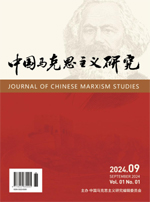Theoretical Foundations, Historical Approaches, and Shanghai's Practice in the People's City
人民城市的理论基础、历史进路与上海实践
- ACADEMIC FRONTIERS PUBLISHING GROUP(AFP)
- Journal of Chinese Marxism Studies (JCMS)
- Vol.2 No.7
-
2025.0757 - 65 (9 pages)
-
DOI : 10.62989/jcms.2025.2.7.57
- 3

With the advent of the new era, China's urban construction has entered a new developmental phase. This paper aims to examine the relationship between Marxist urban theory and the Chinese theory of the “People's City,” systematically analyze the experiences and achievements of urban development since the founding of the People's Republic of China, and focus on the theoretical and practical achievements of Shanghai's “People's City” initiative. Through theoretical, historical, and qualitative research methodologies, combined with empirical analysis of Shanghai's urban construction practices, this study reveals the theoretical core of the People's City framework: its people-oriented stance, dialectical methodology, and multi-dimensional coordination. Furthermore, it elucidates how this framework operationalizes people-centered development paradigms, citizen-participatory governance principles, and public-satisfaction-driven implementation mechanisms, thereby profoundly articulating the essential logic and fundamental imperatives of urban construction in the new era. The research outcomes not only contribute to the global discourse on urban governance but also provide replicable Chinese experiences for cities worldwide.
随着新时代的开启,中国的城市建设进入新的阶段。本文旨在通过研究马克思主义城市理论与中国人民城市理论的关系,梳理新中国成立以来的城市建设经验和成就以及聚焦上海市“人民城市”的理论与实践成果,从理论和实践两个方面呈现出中国的城市建设成果,并为其他国家和地区提供中国经验。本文采用理论分析法、历史研究法、定性研究法等方法,结合上海城市建设的现实成果详细分析,揭示了人民城市理论以人民性为立场、辩证法为方法、多功能统筹为指导作为其理论核心,以人民中心为发展图景、以人民主体为治理准则、以人民满意作为其实践原则,深刻阐释了新时代城市建设的核心要义和根本要求。
1 引言
2 人城相融:人民城市的理论基础
3 励行以城:人民城市建设的历史进路
4 东方之城:人民城市理念下的上海实践
5 结语和展望
参考文献
(0)
(0)